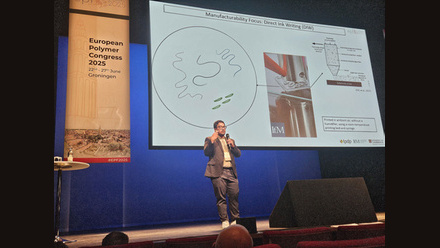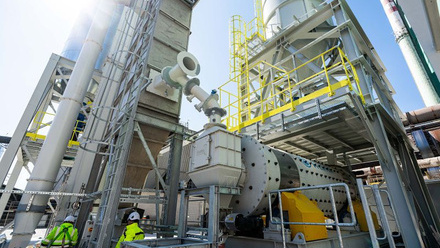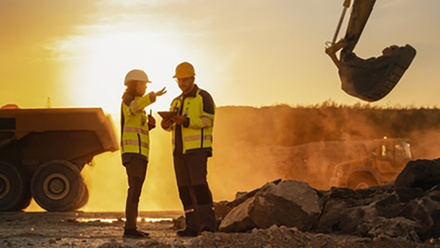The future of ‘green skills’
Andrea Gaini puts questions to industry and academic representatives about securing the skills we need to power a ‘green economy’.

Panellists
Representatives from the IOM3 Resources Strategy Group (RSG) and IOM3 Sustainable Development Group (RSG/SDG)
Sam Alvis, Head of Green Renewal at Green Alliance (SA)
Jenny Young, Head of Strategy, Policy and Insights at the Engineering Construction Industry Training Board (JY)
Dr Sarah Gordon, Exploration Geologist in the mining industry, CEO and Co-Founder of Satarla (SG)
Bhavina Bharkhada, Head of Policy & Campaigns at manufacturing trade body Make UK (BB)
Professor Matt Davidson, Head of the Centre for Sustainable and Circular Technologies, and Professor Andrew Burrows, Head of the Department of Chemistry, University of Bath (MD/AB)
Professor Paul de Leeuw, Energy Transition Institute at Robert Gordon University (PDL)
How would you define ‘green skills’ and why are they important?
RSG/SDG: At its most literal, 'green' is epitomised by plant photosynthesis. The second most basic aspect is an awareness of how normal industrial processes differ from photosynthesis. Typically, normal industrial processes use high temperatures and pressures with enormous losses of energy – strictly speaking of exergy – and usually the quantity of waste far exceeds that of the desired end-product. This awareness implies a correct appreciation of the relevant thermodynamic principles.
A 'green' industrial process tries to imitate desirable features of natural photosynthesis – mild conditions, the use of water rather than organic solvents, and benign or even beneficial by-products rather than toxic or polluting waste. Recognition of the importance of green skills implies recognition that we cannot continue with business as usual.
SA: Green skills cover any role we know will be important to the future of our economy, an economy that is positive for climate and the environment. That will be a mix of new roles, for example, those learning how to manufacture, install and maintain heat pumps, and those adding a green string to their current bow – a doctor helping to reduce waste in an A&E. Many skills will become ‘green’ by the direction of businesses, for example, someone who spray paints petrol cars will be practising a green skill by spray painting an electric car. It’s important we focus on this full range of green skills so the UK Government can ensure businesses are equipped for the future economy, regardless of their sector.
SG: Green skills can be interpreted in a number of ways, however, typically pertain to the ability to understand and manage sustainability – or environment, social and governance (ESG) factors. This can be done by understanding the impact that an operation may have on the environment or local community and proactively managing it so that any threats are eliminated or reduced; understanding the impact that the environmental and social context may have on your activities, both now and in the long term, and designing your operation so that it takes these into account; and understanding the broader governance and macro-sociopolitical trends and requirements.
BB: Green skills are effectively an amalgamation of environmentally conscious knowledge, strategies and abilities to support a sustainable and resource-efficient manufacturing sector. They are important to manufacturers because it is not only new jobs/professions that will require these skills, but existing jobs too.
JY: Green skills are often the same engineering, construction and project management skills we already have, but applied and/or adapted to ‘green’ projects, such as decarbonisation, clean fuels, fuel switching, energy efficiency and emissions reduction. Engineering construction is fundamental to many of the industrial heavy-emitting sectors that will need to decarbonise, as well as encompassing many of the renewable generation sectors. The required skills will become a core and integral part of engineering construction skills rather than a distinct, ring-fenced engineering base.
MD/AB: Training PhD students in fundamental concepts of sustainability is at the core of [our] training programme. It is vital to have this broad interdisciplinary understanding of what ‘green and sustainable’ is, as well as the disciplinary depth of a PhD research project. We do this through cohort-based PhD training and close involvement of a wide range of external partners – industrial, government, NGO and learned society. Exposing PhD students to all of these perspectives and publics is vital to hone their understanding of the complexity of the problem and to develop their advocacy skills as future leaders in green chemistry and sustainability. In terms of undergraduates, it is essential for students to understand the principles of green chemistry and how they can be applied in the real world.
PDL: We define green skills as those skills and capabilities that have a direct, positive impact on addressing the challenges associated with the climate emergency, with improving the planet and with accelerating the transition to a sustainable, net-zero world.
What specific skills are required?
RSG/SDG: IT skills – better data will help better decision-making. Life-cycle analysis (LCA) skills will help us design with end-of-use in mind and enable circular systems to become normative, but we will need new technical skills around chemical recycling, carbon capture and storage, and materials handling and transition management, as well as communications and behavioural change skills. This is a huge step-change for staff, owners and the general public so we need to take everyone with us.
SA: There is currently a big focus on manufacturing skills for net-zero infrastructure and goods. This is welcome, but we also need to think about the skills required to minimise and manage our resource use. To keep products going for longer, we need higher numbers of people able to repair goods, remanufacture them and also encouraging recycling. Similarly, new types of technology will need a battery of people involved in their upkeep and maintenance. The other area often overlooked is in the natural environment.
SG: The circular economy and energy transition is a very exciting time for the extractives sectors as it heralds the need for greater volumes of a far more diverse array of commodities than ever demanded in the past. However, for the sector to deliver, we need to ensure that we do so in line with sustainability principles, otherwise we risk creating a larger problem than that which the circular economy is attempting to solve.
Skills required include: specialist skills in ESG; an understanding within technical disciplines as it is typically the geologists and engineers who deliver on the sustainable outcomes; engineering skill to design a sustainable operation; financial experts inclusive of inhouse finance teams, investors and insurers that focus on the impact and action being taken regarding ESG; policy setters and regulators that have an understanding of the above skillsets and requirements.
BB: Our research to date shows the skills needed can be split into technical green skills and wider, generic skills to make the transition. In terms of the technical green skills, these include, but are not limited to, carbon accounting, carbon emission minimisation, environmental impact assessment, and product/process design skills. In terms of the generic skills, this will include leadership skills to make the cultural changes required to become net-zero, but also management skills to implement the adoption of new green technologies in businesses that can genuinely make a difference.
JY: For the specialist engineering construction sector, the good news is that many workers in the UK supply chain already possess the core competencies needed and there is scope for adaptation and accelerated reskilling. The move towards net-zero requires contextualisation of existing skills for carbon capture, utilisation and storage (CCUS), hydrogen and biomass, carbon accounting, policy and finance, collaborative working and construction. So, the challenge our sector faces is about the anticipated increase in demand for skilled workers, but not necessarily new skills.
MD/AB: PhD students need to have the research project-based depth, coupled with broader perspectives and advocacy skills. We also instil a culture of entrepreneurship in our students to encourage the translation of disruptive research into commercial technical solutions. Exposure to entrepreneurial academics and to small, high-growth, high-tech companies, as well as global multinationals, is important to catalyse innovation.
PDL: In our recent UK Offshore Energy Workforce Transferability review, we highlight that the offshore energy workforce mix will change significantly in the next 10 years, with roles in decarbonised energies projected to increase from 20 to 65%. The review also indicates that around 200,000 people are likely to be required in 2030 to support activities including offshore wind, hydrogen, CCUS, and oil and gas. This compares to around 160,000 people directly and indirectly employed in the UK offshore energy sector in 2021.
Around 80% of the jobs in 2030 are envisaged to be in nine key job families – operations, technicians, engineering, projects, commercial/business development/marketing, procurement/supply chain management, finance, HR, and health, safety, sustainability and environment (HSSE).
Is progress being made to develop these skills?
RSG/SDG: Of course, we are training our sectors to be fit for their current role and as it adapts so we prepare them, but we need to plan for five years from now and start that training programme.
SA: The UK Government put skills at the centre of its recent Queen’s Speech, and a core part of its levelling-up agenda. We are also expecting the findings from the Green Jobs Taskforce at the time of writing. It’s important these things are put together. Government should set out a framework for skills it thinks will be required in the green economy, both the quantity of certain roles, and where they will be. This should then inform government policy for boosting skills, particularly in areas of strategic priority or where there is a particular dearth.
SG: Yes, progress is being made, however it could be faster. The massive increase in focus on ESG is leading to workforces changing in their skill make-up and further training beginning to happen. This training needs to take place beyond the operators, however, with those responsible for investing, insuring and regulating also requiring understanding. This will allow those outside of the operating environment to ask the right questions that will truly hold operators to account. With regards to the next generation, many mining-focused university degrees have been abandoned in recent years in the UK. We are beginning to see a change in this, with a big rethink regarding what role geosciences truly play in society, such as that led by the Geological Society.
BB: Progress to date has been slow, partly because government needs to identify the green skills needed. If our prediction is true, in the manufacturing sector alone, we would need to support the upskilling of 2.7 million people working in our industry. The UK Government’s 10-point plan was welcome and, to date, the government has set up the Green Jobs Taskforce to support the transition to a high-skill, low-carbon economy by developing a action plan – details of this have yet to be shared, but industry stands ready to support where we can. In addition, the Institute for Apprenticeship and Technical Education Green Advisory Panel will shape and steer apprenticeship standards going forward. This is a welcome move to ensure we have the skills we need in the future embedded in our apprenticeship standards.
JY: Yes, the ECITB has initiated some programmes targeting the existing workforce and new entrants. In September, we will launch a new two-year ECITB Energy Transfer Technician Scholarship to help equip the next generation of engineers. Employers are looking at how to upskill their existing employees.
PDL: The UK oil and gas workforce are very well placed to take advantage of the new opportunities in the offshore renewables sector. Over 90% of the UK’s oil and gas workforce have medium to high skills transferability and the majority are well positioned to work in adjacent offshore energy sectors. Particularly soft skills and other non-technical skills are generally highly transferable. New induction programmes and targeted upskilling programmes are being developed and many companies are already evolving to support the wider market. The expectation is that the future workforce will be more energy agnostic and will be able to support a more diverse range of energy-related activities.
What are the main challenges to upskilling?
RSG/SDG: A big challenge is the battle between competitive routes and technologies to net-zero which means that investments are widespread and potentially small-scale in adoption. Of course, this is all a part of the revolution that is under way as we rethink and attempt to solve the big questions in a short time.
SA: There are several:
- We do not have a framework that clarifies what skills and jobs we will need in the future, or defines what government sees as 'green work'.
- The public lack understanding. There is also concern that green jobs are a short-term political gimmick and is therefore a risky move.
- There is a strong political focus on reskilling, which cannot come at the expense of helping those with transferable skills, or pitching green courses and skills to those still in education.
- Local authorities lack the resource to develop green economic opportunities and match them with local skills supply. We need institutions that will mediate the transition between skills providers, businesses and government.
- There is not currently a strong incentive for the private sector to develop green skills. While we have strong targets, they are not accompanied by clear strategies and short-term sectoral targets. Without these, businesses do not have the confidence to change business models or develop new green roles.
SG:
- University degrees are either not including these skills or being shut down.
- Employers being willing to pay for training in times that will be tight economically and regarding free time available for learning.
- Confusing messages – there are currently hundreds of standards/guidelines/principles, etc. that could be adhered to – how do you choose which is the one(s) for you?
- The need to pull together skills from across disciplines.
BB: The biggest barrier lies in adapting existing education and training provision to meet this need. Make UK research shows that many manufacturers are keen to embrace digital skills and a more digital way of learning, through modular and flexible learning. But our current training routes are not designed to deliver this. We need to proactively create a system of lifelong learning which has agility and flexibility built into it to embrace current and future challenges.
JY: Currently, the pipeline and geographic spread of projects is still uncertain due to pending government funding, regulation and timeline announcements. Employers, particularly those further down the supply chain will want further certainty of orders before investing in upskilling. Large ECI decarbonisation projects are still at front-end design stage so further detail on specific skills gaps will emerge during detailed design and construction. There is a further challenge to establish sufficient post-16 training capacity to deliver the necessary skills at the scale, pace and location required. This will need to service demand from new entrants as well as demand from the existing workforce.
MD: Funding for doctoral students – we have always been hugely oversubscribed in what is an attractive and societally important area for research and training. We are not short of training or research capacity. We are short of PhD scholarships to fund as many of the best students around the globe as we would like.
PDL: There will be a need to maintain existing oil and gas activities, while developing the new low-carbon future in parallel. This will require a careful balancing act and the need to find the ‘goldilocks zone’, whereby public and private sector pull all the correct levers to get the transition ‘just right’. It is key that UK and devolved governments work together to ensure the managed transition of skills and experience in a way that protects and sustains key UK energy jobs.
What further training and qualifications need to be developed?
SA: The required framework from the UK Government can inform education institutions that want to introduce new courses. This could be modelled on the Gatsby benchmarks used by the Careers & Enterprise Company. Government should work with universities to brand courses in the green economy, making sure they are advertised in colleges and schools to attract graduates before they make decisions to pursue other careers.
SG: More integrated courses that bring together different disciplines. By this I mean social scientists working with engineering and geology departments to equip graduates with what they need in the wider world. Easy-to-access ESG training that is practical and provides the learner with the tools and confidence to implement what is needed in their workplace.
JY: We will need localised site construction skills in the geography of industrial clusters once locations are known. Technicians will require more multidiscipline training. This could be delivered through bite-size, modular training, which can be delivered at the point of need for skills areas such as leadership, policy, finance, and ‘green’ technology for existing professionals.
How can government, industry and academia work together?
RSG/SDG: Success will only be achieved through cross-sector collaboration. This is not easy and not a matter of just making connections. But it ultimately comes down to the simple question – do we want to develop an economy that limits the impact and effects of human activity on the natural environment? If so, we need to have a well-defined plan on how this can be achieved.
SA: They can:
- Increase knowledge for people and training providers.
- Provide strategic funding to universities to launch graduate-level courses and grants to individuals.
- Increase security for retrainers through maintenance loans and expand eligibility of Job Centre courses to cover green skills.
- Better match skill demand and supply, through Local Enterprise Partnership (LEP) or a new institution-led convening on local labour markets.
- Support local authorities to recognise potential environmental economic projects. The Green Jobs Taskforce should also work with local authorities to deliver skills strategies that reflect dynamic local environments.
SG: Start with what good looks like and then work out who holds on to what lever to make it happen. No one stakeholder can make this happen. Investors need to invest in and reward the responsible operators, penalising those who do not take ESG seriously by not investing in them. In turn, the members those investors represent will hold the investors themselves accountable for this. Governments can support by leveraging existing laws and streamline permitting and other regulations so that the responsible mining opportunities are encouraged rather than bogged down in red tape. Academia should focus on the research that will have true impact in improving the extraction and processing of raw materials. When funding and carrying out research, this question of impact needs to be constantly revisited.
BB: The UK Government’s new Local Skills Improvement Plans are key to getting this right. While these will be designed to tackle local skills mismatches, as well as ensure skills training is locally-driven, and can be tailored to the challenges and opportunities in specific areas – manufacturers will want to ensure this works with other areas of policy too, driven by data aligning to the skills needs of regional economies. Make UK has called for the establishment of a National Skills Taskforce, with a remit that includes the development of a skills programme to tackle these skills shortages. In addition, we are calling for a Green Skills Tax credit, which can support manufacturers who begin to invest in green skills.
JY: Coordination between government, industry and skills bodies, such as the ECITB, will be essential to build a geographically-nuanced picture of the skills demand and timing to deliver the commitments of the government’s 10-point plan. The ECITB is represented on the Green Jobs Taskforce. We will also be working with the Industrial Decarbonisation Research & Innovation Centre in support of their skills knowledge-sharing activity across the industrial clusters. We are also supporting the new Green Apprenticeships Advisory Panel to consider how apprenticeship standards can reflect the requirements of net-zero in a coherent and timely manner.
MD/AB: I believe we still need better long-term models to leverage core public funding to unlock private co-funding in the area for PhD training. Industry's main contribution at undergraduate level is taking placement students. This is a great way for them to gain relevant experience as part of their programme.
PDL: The higher education sector will have a key role to play in upskilling and reskilling the offshore energy workforce and it is encouraging to see that universities, colleges and commercial training providers across the UK are developing programmes to support the energy transition, ranging from new technical courses to energy policy and energy system integration. Common standards, accreditations and career pathways need to be developed to ensure a more flexible and agile offshore workforce.







